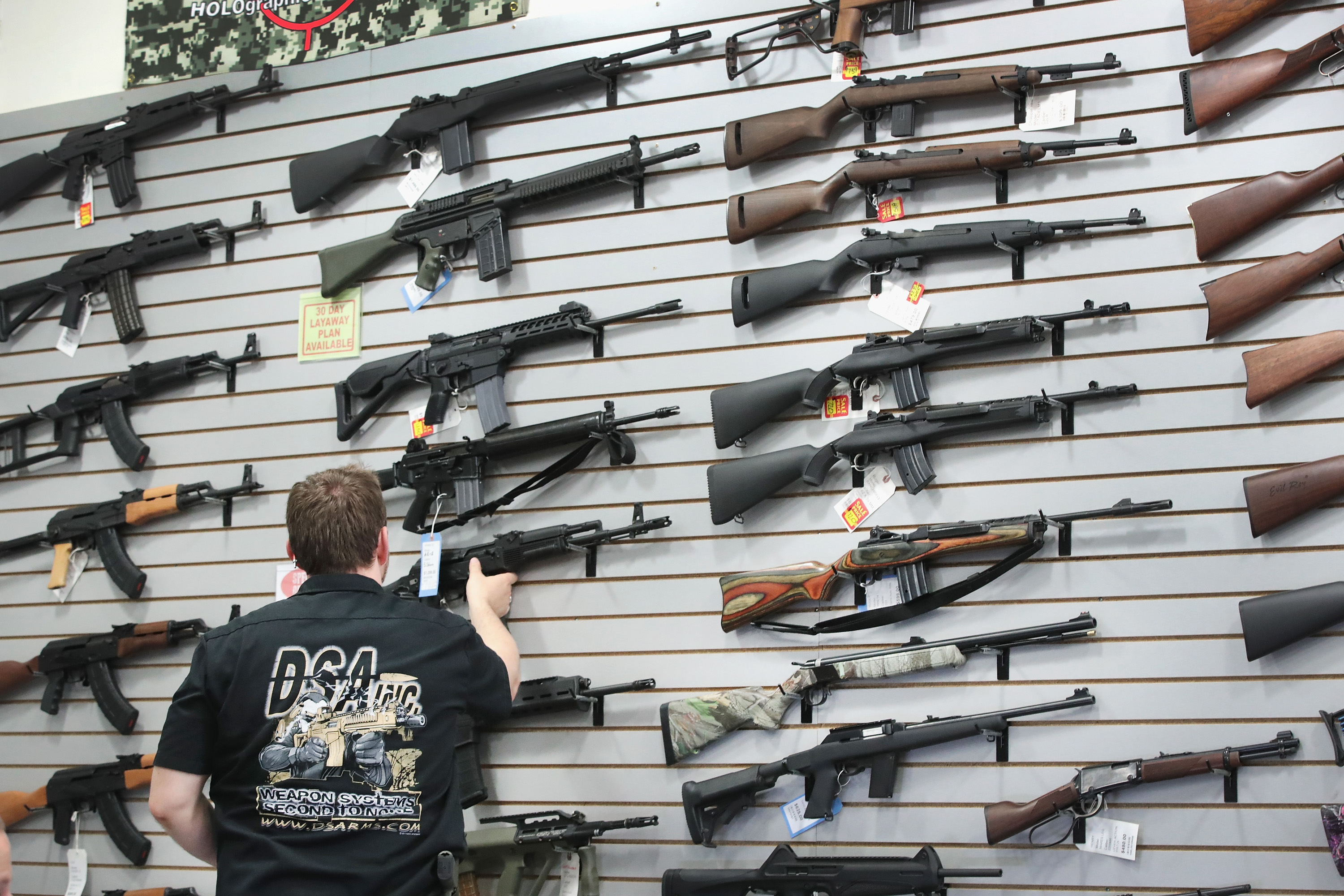The federal government has appealed a judge’s recent ruling allowing an illegal migrant to lawfully possess firearms.
On April 4, acting U.S. Attorney Morris Pasqual appealed Judge Sharon Coleman’s March ruling to allow an illegal migrant in Illinois to possess guns to the U.S. Court of Appeals for the 7th District. Pasqual was appointed by U.S. Attorney General Merrick Garland in March 2023 to serve in his current role for the Northern District of Illinois.
The appeal, filed within 30 days of Coleman’s decision, contained no additional information or explanation.
Newsweek reached out via email to Pasqual, the Department of Justice (DOJ), the White House and the Northern District of Illinois for comment.

Scott Olson/Getty Images
In an eight-page ruling filed March 8, Coleman dismissed charges against Heriberto Carbajal-Flores, who was illegally or unlawfully in the United States when he possessed a handgun in the Little Village neighborhood of Chicago on June 1, 2020.
“The Court finds that Carbajal-Flores’ criminal record, containing no improper use of a weapon, as well as the non-violent circumstances of his arrest do not support a finding that he poses a risk to public safety such that he cannot be trusted to use a weapon responsibly and should be deprived of his Second Amendment right to bear arms in self-defense,” Coleman, who was appointed under President Barack Obama, wrote.
The defendant was charged under Title 18 of U.S. Criminal Code, which legally disallows undocumented individuals to possess firearms and ammunition “or to receive any firearm or ammunition which has been shipped or transported in interstate or foreign commerce.”
He “has consistently adhered to and fulfilled all the stipulated conditions of his release,” Coleman’s ruling says, adding that he is gainfully employed and has no new arrests or outstanding warrants.
Nicole Brenecki, an attorney who specializes in labor law and has no connection to the case, told Newsweek the move from the U.S. attorney could be about optics as immigration continues to be a dominant issue in the 2024 election cycle.
“In light of the current events at the [southern] border and the upcoming presidential election, immigration is now a hot topic in the political and legal arena,” Brenecki said via email. “As such, the filing of the appeal on Judge Coleman’s ruling could be perceived as a move made for optics.
“More importantly, however, if the ruling is not reversed, it could result in courts being heavily burdened with making fact-specific determinations in each individual case. The appeal, if successful, could potentially prevent that.”
Carbajal-Flores initially contended that his firearm was possessed for self-defense and protection of property “during a time of documented civil unrest” in the spring of 2020, notably during the societal backlash and protests across the U.S. in response to the police killing of George Floyd.
Floyd was murdered on May 25 of that year by Minneapolis Police Officer Derek Chauvin, who was later sentenced to 21 years in prison.
Coleman’s ruling came after Carbajal-Flores was previously denied two motions of dismissal of his charges.
The first time was on April 13, 2022, and the second on December 19, 2022—about six months after the U.S. Supreme Court voted 6-3 to strike down a 100-year-old New York law requiring that individuals show “proper cause” to get a license to carry a firearm outside a home, stemming from the 2022 ruling in New York State Rifle & Pistol Association, Inc. et al v. Bruen, Superintendent of New York State Police, et al.
That ruling was brought to the higher court after being challenged by the New York State Rifle & Pistol Association and gun owners Brandon Koch and Robert Nash.
“We hold that when the Second Amendment’s plain text covers an individual’s conduct, the Constitution presumptively protects that conduct,” Justice Clarence Thomas wrote in the court’s majority opinion. “To justify its regulation, the government may not simply posit that the regulation promotes an important interest. Rather, the government must demonstrate that the regulation is consistent with this nation’s historical tradition of firearm regulation.”
In May 2023, the U.S. Supreme Court ruled in favor of gun control advocates in Illinois and denied a request for an emergency injunction against the state’s ban on the sale and new possession of semiautomatic firearms.
The request was made by the National Association for Gun Rights (NAGR) in response to Illinois Governor J.B. Pritzker’s signed legislation enacting a statewide ban on “assault-style” weapons, including limits on magazine capacities.
Update 04/09/24, 12:49 p.m. ET: This story was updated with comment from Nicole Brenecki.
Uncommon Knowledge
Newsweek is committed to challenging conventional wisdom and finding connections in the search for common ground.
Newsweek is committed to challenging conventional wisdom and finding connections in the search for common ground.

